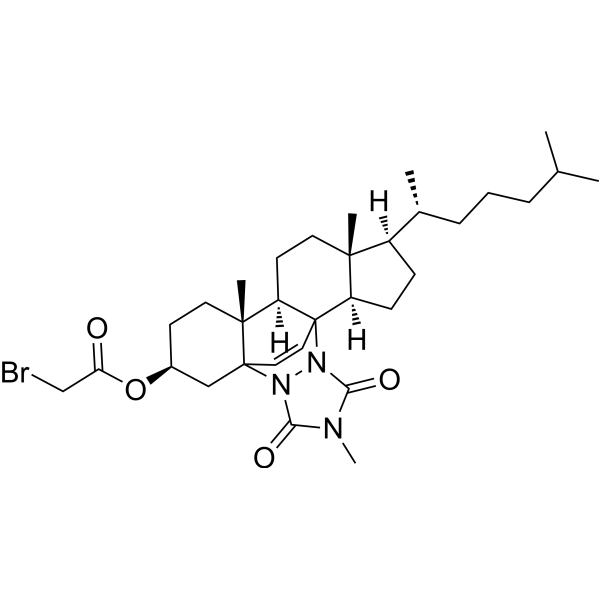1817841-22-7
| Name | MeTC7 |
|---|
| Description | MeTC7 is a Vitamin-D receptor (VDR) antagonist. MeTC7 has potent VDR inhibition activity with an IC50 value of 2.9 μM. MeTC7 shows good antitumor effects[1]. |
|---|---|
| Related Catalog | |
| Target |
IC50: 2.9 μM (VDR)[1]. |
| In Vitro | MeTC7 (compound 5) shows potent VDR inhibition activity with an IC50 value of 2.9 μM[1]. MeTC7 disrupts the VDR-Ligand-binding domain in Silico[1]. MeTC7 (250 nM; 18 h) suppresses RXRα and Importin-4 expressions in the ovarian cancer cell-line[1]. MeTC7 (250 nM; 18 h) inhibits the viability of ovarian cancer cells and induces PARP1 cleavage[1]. Western Blot Analysis[1] Cell Line: 2008 cells Concentration: 250 nM Incubation Time: 18, 12 h Result: Reduced the expression of RXR-α, Importin-4 and increased cleaved PARP1 expression in 2008 cells. Cell Viability Assay[1] Cell Line: SKOV-3, IGROV-1, CAOV-3, OVCAR-3, OVCAR-8, and 2008 ovarian cancer cell-lines Concentration: 0, 0.25, 0.5, 0.75, 1.0, 1.25 μM Incubation Time: 24 h Result: Reduced the viability of SKOV-3, IGROV-1, CAOV-3, OVCAR-3, OVCAR-8, and 2008 ovarian cancer cell-lines. |
| In Vivo | MeTC7 (compound 5) (i.p.; 10 mg/kg) reduces the growth of the spontaneous transgenic TH-MYCN neuroblastoma and xenografts in vivo[1]. Animal Model: Mice[1] Dosage: 10 mg/kg Administration: IP Result: Reduced the growth of xenografts derived from ovarian cancer, medulloblastoma, and pancreatic cancer cells. Inhibited the growth of neuroblastoma cells and Xenografts. Reduced MYCN expression and blocked the growth of TH-MYCN transgene-driven spontaneous neuroblastoma. |
| Molecular Formula | C32H48BrN3O4 |
|---|---|
| Molecular Weight | 618.65 |
